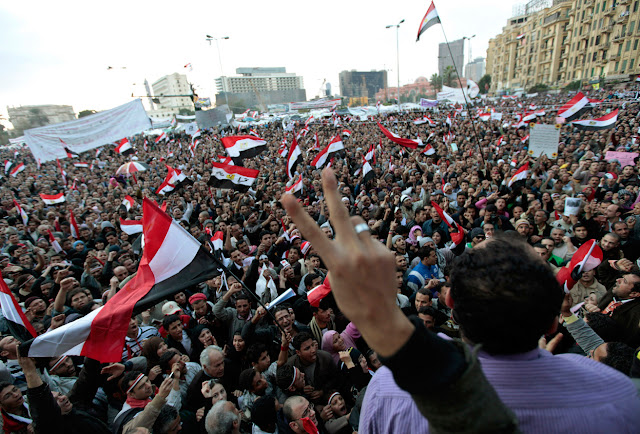Daniel Bertrand Monk,
Colgate University
Daniel J. Levine,
Colgate University
When young Israeli professionals erected a tent city on Tel Aviv’s Rothschild Boulevard in protest against the Netanyahu government’s indifference to an affordable housing crisis in Israel, they self-consciously modeled their efforts on the popular revolutions commonly referred to as “the Arab Spring.” Handmade signs reading “Rothschild, Corner of Tahrir” invite us to make comparisons between the style of this ‘Israeli Spring’ and the events in Cairo that brought down the Mubarak regime last April. Many commentators have done so as well.
 |
| “Among the many handmade signs in the Israeli protests is this one prominently stating: “Rothschild, Corner of Tahrir.” |
 |
| "An Israeli matron reads about the previous night’s protests in a Tel-Aviv café. The newspaper’s headline: “Israel in the Streets. 300,000 protestors. A New Land.” |
 |
| "3 years military, education, job...no housing" |
 |
| "Could we have a piece of the pie" |
 |
| “The Tent City on Rothschild Boulevard functions as a commune, with free haircuts, seminars, music, religious services, and Arabic lessons” |
Eretz Nehederet, Israel’s equivalent of The Daily Show, satirized this situation brilliantly. When its host asked a cast member playing Dafni Lif (the original organizer of the tent protests on Facebook) “what are your demands?” She replies: “Um…the People demand the things everyone agrees on…about…them”). Chiding the host for insisting that she specify the movement’s aims, Lis merely reverts to the most repeated of the protestors’ slogans: Ha’am Doresh Tzedek Chevrati (“the People Demand Social Justice”)
 |
| "If you will it, it is no dream" |
But the numbers belie this. Israel’s curious coalition of the disaffected has emerged in an economy that is enjoying higher growth in real GDP than Bahrain, Brunei, and Oman. In sharp contrast to Athens or Cairo, Israel has almost halved its unemployment rate since 2003, and 80% of its wage earners are employed in service industries. Many of the “urban Bedouins” of Rothschild Boulevard get up every morning, zip up their tent flaps, and go to work in the high tech sector. If nearly one quarter of Israel’s citizens are now falling below the poverty line (and if its middle class has “vanished,” as former Israel Manufacturers Board chair, Dov Lautman claims), it is because the government of Israel is forced to maintain the costly infrastructure of two para-states – one for the ultra-orthodox and another for the settlers – before it can even begin going about its own business.
As we have argued in a previous essay in this series, this ‘retreat of the state’ was largely ignored in a period when most still Israelis felt they had a stake in general economic expansion. For Prime Minister Netanyahu and his cronies, this amounted to a welcome ‘indifference dividend’ concerning the cost of purchasing enough political consensus to maintain a parliamentary majority. But the pie can only be cut so many ways. The issue now is that the maintenance of the para-states is rapidly becoming the government of Israel’s only business, as surrogates for market interests in the Netanyahu administration clamp down on all other spending. The result is a political double standard. Political transfer payments to settlers and ultra-orthodox are accepted as the cost of doing business. For everyone else – from the education and health care systems to the fire service, whose collapse due to sustained budgetary neglect left much of Israel to burn in forest fires last December– an ideology of austerity prevails. There is no addressing “the people’s” demand for social justice without facing this.
 |
| "School of the Revolution" |
In itself, this attempt to wish away an increasingly zero-sum dispute between those whom we have elsewhere called Israel’s ‘statists’ and its ‘radicals’ is nothing new. It draws on a tradition in Israeli state building that is older, in fact, than the state itself. The earnest belief that what appear to be political divisions are in fact administrative or technical problems has a long legacy. From Herzl’s Altneuland (1902) to Shimon Peres’ Imaginary Voyage (1998), the fruits of rational economic and social administration are presumed to dissolve political disagreements – well-stocked hospitals, efficient rail lines, electric streetlights can displace zero-sum contests over the status of the land and the nature of the polities to emerge on it.
It is through such denial that the demonstrations can now somehow not be about ‘politics’ – the moral, economic and human costs of the radicals’ interest in the occupation, and its basic incompatibility with the liberal-parliamentary ideals of Israeli statists. A protest that called that other, deeper, division by name would differ as markedly from the present one as would a Berkeley ‘teach-in’ from a Sorellian general strike. That, we submit, is the true difference between the protests in Rothschild Boulevard and those in Tahrir Square.
Whether by intuitive or intentional cynicism, Netanyahu has been playing on this kind of denial, as when he reportedly cited Herzl’s ‘pragmatism’ to Manuel Trajtenberg (head of his new blue-ribbon commission on Israel’s socio-economic crisis) as a model for his willingness to take seriously the protesters’ demands. It will do Mr. Netanyahu little good. His brand of cynical reason can no more protect the political status quo from the consequences of the bourgeoning ‘resource war’ than the protestors’ enthusiasm for unstated alternatives to the same status quo can protect them from a nasty confrontation with Israel’s ‘radicals’. Given the prevailing level of denial and displacement, one is left to wonder if—when the confrontation between the radicals and ‘everyone else’ comes out into the open—any of the unfortunates caught in the melee will have any idea why.
 |
| “Fragile, reads a protest poster displaying the official emblem of the State of Israel.” |



















